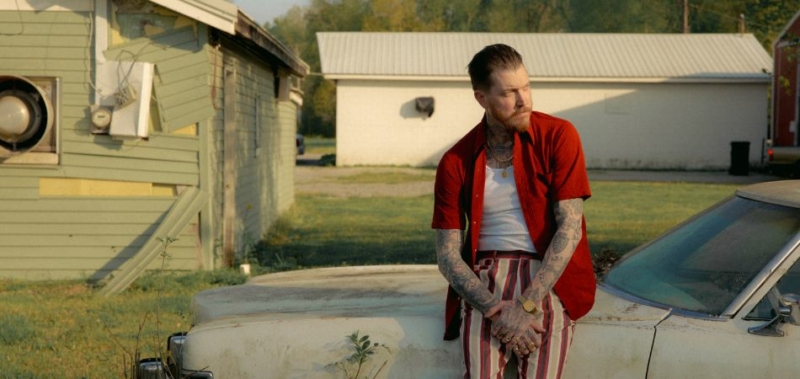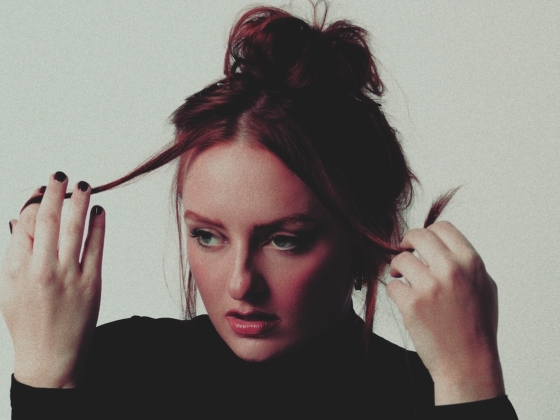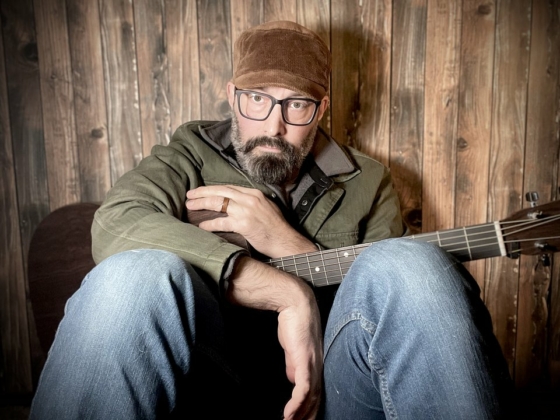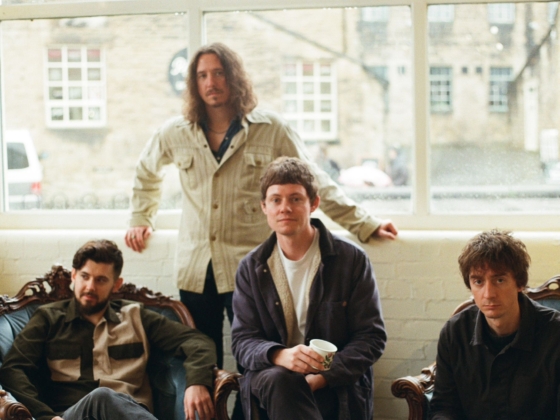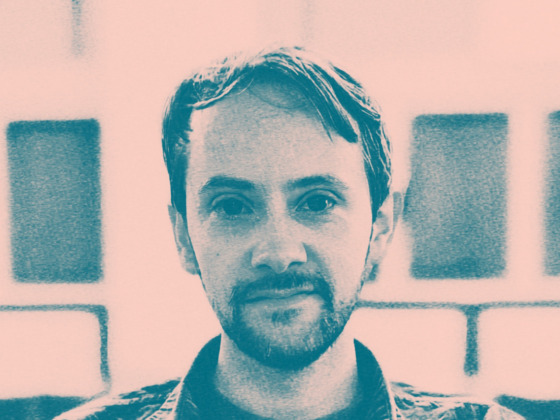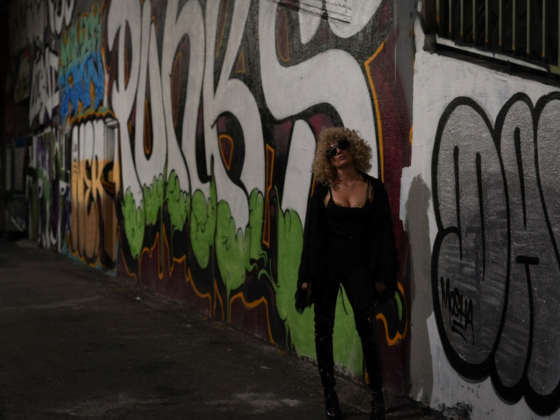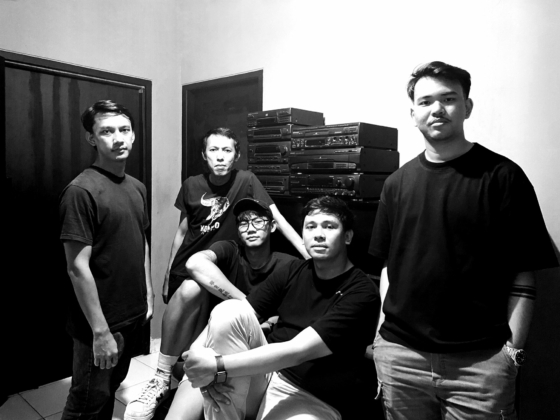No two artists are built the same—that’s what makes each musical journey uniquely personal, shaped by background, influences, and the passion that compels them to make music.
Missouri-born and now Nashville-based rock artist Bones Owens has been crafting songs since he was 13.
With three full-length albums and two EPs already under his belt, Owens is now set to release his first self-produced, 15-track album, Best Western, this September.
The record carries the weight and wisdom of a man who’s lived many lives in one—blues-drenched, gritty, raw, and unmistakably authentic Owens.
From our candid conversation, it’s clear that Owens doesn’t rely on excess—what matters most is that his music comes through exactly as he intends. In this interview, Owens opens up about his new album, the inspirations fueling his creativity, and advice for emerging artists.
What inspired the album’s title Best Western, and how does it reflect where you are in life creatively right now?
There's a song titled “Best Western” on the album, that song was already titled before I decided I was going to title the album Best Western.
The beginnings of that song were actually at a roadside motel. It was at an actual Best Western motel that I was staying in in Georgia while I was filming this movie.
So I had brought a guitar and a computer, and I was starting the first ideas for what became that song, “Best Western.”But a couple of the other songs were taking shape during some of my downtime in that hotel.
Partially, that is kind of why it ended up being called that. But I like the roadside motel kind of as a metaphor, and Best Western even more so.
At some point back in the — I don't know — whenever roadside motels were prominently a thing, those motels were probably, like, one of the go-to spots.
The name Best Western just feels to me like this sort of ironic thing now, because a lot of those kinds of roadside motels are dilapidated, and it's kind of where people on the fringe of society kind of exist.
I can relate to that. I can relate to those people.
There’s a grit and sort of Wild West thing to staying in those hotels — you're kind of on high alert. So, Best Western as a whole, to me, is one of the last vestiges of what it used to be, like traveling around the country.
I still do that, obviously, for my job. I tour all the time, but we don't tend to stay in those kinds of motels, like I have in my early days.
So, staying in one of those while I was making that movie rekindled some sort of thing for me about just that hand-to-mouth kind of living. It's a little rough, and it's a little bit exciting and scary and all that stuff.
The album has a blues-soaked tone—both in the vocal effects and in the textures of the electric guitar as it comes through the amps. Can you talk about that sonic decision and how it ties into the overall theme you were aiming for?
Sure, I mean, that's kind of like what I was saying about the album itself having a kind of gritty overtone thematically and all that. I think just sonically matching that to some extent was important to me.
Not to mention that my favorite records tend to have a grittiness to them. I don't know, I've just never really been one for over-polished studio productions.
I mean, it's funny because people will come up to me after shows at Merge Table or something like that and be like, “Oh man, I love the albums, but the show is so much grittier, and so much more raw,” and comparatively to the albums, in my opinion, even the albums, I think we try to make sure we don't overcook anything or overproduce it.
That sound — that vocal sound that you're talking about — I think harkens back to even early blues.
Look, my voice doesn't sound like Howlin' Wolf or something like that, but with the right microphone, you can add a little more gravel to it.
Other people did that—rock and rollers in the ’60s who were also influenced by those same blues artists, like Jim Morrison from The Doors, for example—actually used one of the same vocal microphones that we use in the studio quite a bit.
Anyway, yeah, it's a conscious choice. I like the sound of that.
I think it was an insecurity in my own voice when I first started using microphones like that. I just didn't like the way my voice sounded plain. I wanted it to be pretty affected.
I'm more comfortable with it these days, but that's kind of become part of the — I don't want to say signature sound, because a lot of people might use those sounds — but yeah, something like that.
Did you experiment to find that specific retro sound, or did you try it on one song and decide, “Let’s use it for the whole album”? How did that come about?
I'm trying to think now. I think we started using some vocal effects like that on an LP back in 2017 called Make Me No King.
There's a song on that album that particularly stands out called “Long Long Time,” where we use a pretty dirty vocal effect, and it came out really cool. We ended up using it on a couple of other songs on the album.
I got to give credit to Paul Moak, my longtime producer and owner of the studio called The Smoakstack in Nashville, where I've done almost all of my albums.
He’s got a giant room full of different microphones, and we just kind of experimented with different stuff, and he made a couple of good suggestions, and I think that's how that vocal sound really first came about.
What does your songwriting process typically look like—do you start with lyrics, a melody, or a particular feeling you’re trying to bottle?
It varies, but as a rule, I start with music, and then I kind of see what is coming from that — just sitting with an instrument for a while until I'm playing something that feels like it could be something, and then start building around that.
With especially the more rock side of the stuff that I do, it's so based on feel that I don't want the feel to have to match the cadence of a vocal — I'd rather it be the other way around.
I studied English and Creative Writing in college, and I used to write a lot of poetry, and some songs would start from that. There's definitely been times when I've got something that's almost fully written lyrically, that’s more in poem form, and I don't know what it's gonna end up on.
But yeah, oftentimes it’ll just be the genesis of what's gonna become a song for me.
Did you approach this record differently than your previous three full-length albums—in terms of writing, production, or intention?
Yeah, a couple things.
From the writing standpoint on this album, I didn’t use any old material at all, which I think most people — they write some brand-new things that are exciting and new, but you're also sifting back through old folders, demos, and things like that, like, “Oh yeah, that was a really good song, let's rework that,” or whatever. I feel like you end up doing some of both.
On this album, I was determined to only use brand-new songs. So I gave myself kind of a short runway, relatively speaking.
Some people write for years for an album. On this one, I wrote for three months or so to get all the songs together, and like I said, I was writing whenever I was making that movie back in December, and then January, February, and when I went into the studio in March. It was kind of a short runway, so that was different.
Then production-wise, like I mentioned — my buddy Paul Moak —he’s been on the road touring again the last couple of years with Heart, so he was on the road at the time. I had been kicking around the idea of self-producing a record anyway, and so that was a first.
I've never self-produced before, so yeah, I guess a couple of pretty different things.
I don't know if any of that will be obvious to people that have been following along when they listen to this one — if it seems different or not — but to me, at least in the back of my head, I know those things were different approach-wise.
Did it feel good to self-produce it and just have that ownership over the whole album?
It did. Something cool about my relationship with Paul is that we're really close friends. There's a lot of trust there, and he's never been that kind of producer that's super heavy-handed — he's kind of just supporting the vision that I have for the albums that he's been a part of, you know?
From the production side, it doesn't feel crazy different — it just felt a little more like I was on my own.
Because I didn't have that sort of cheerleader in the studio, helping me along at times when I had any self-doubt or anything like that. On this record, I just kind of had to push through it. I think that ended up showing me what I was really capable of doing on my own, which was rewarding.
Yeah, I'm happy with how it turned out, thankfully.
That would have been a real bummer if I hated the album — or if other people hated it, you know what I mean? And I was like, “Alright, well, I'll never do that again.”
Best Western opens with the grounding yet wanderlust-driven “Before I’m in the Grave.” What inspired that track, and why did it feel right as the album’s opener?
It felt right as the opener to me because I think musically, partially, just the way that it comes about — it starts with just a guitar and a vocal for a verse.
And whenever it really kicks in, there’s just, I don't know, something about it that just felt like a great intro to the album.
You just hear the guitar and the vocal, and I try to put myself in the shoes of someone listening to the record, particularly for the first time, hitting play on that, or putting the needle down on the record, listening to it — like, “Oh, what's going on here? What's this record gonna be like?” It's just the guitar, vocal, and then it blows up. I like that kind of start.
What was I thinking about when I wrote that?
I mean, there's been a lot of changes and stuff going on in my own personal life in the last couple years, and I feel like you start looking at not only what your legacy is gonna be — I try not to think about that too much — but just how much time you have, and what you're going to do with it.
That song really focuses on righting some wrongs that you've done, and it's sort of a Carpe Diem type of tune.
I think it has about as much to say as any other song on the record as well, so I feel like it was a strong out-of-the-gate type of song musically and thematically.
If you could describe this album as a physical place, what would it look and feel like?
Yeah, I think it's like a roadside motel, but not out in the middle of nowhere.
I made these other records where I really had a desertscape in mind or something. To me, this record is like a roadside motel in a run-down part of town.
I always relate to being on tour, driving through cities.
I'm from a small town, but city-wise, I relate to cities like St. Louis, Pittsburgh, or Detroit — these blue-collar cities where there's a rough grit to the town and to the people in the town.
I think if the album were a place, it's a roadside motel that's kind of gone by the wayside a bit in a blue-collar town.
What keeps you grounded when you're deep in the cycle of touring, recording, and promotion?
Yeah, it's hard to stay grounded, honestly, when you're on the move and there's just a lot of stuff going on all around you, and I'm sort of an easily distracted person.
I used to spend weeks or even months on the road, kind of in an alternate universe and altered state of mind, and things like that. I find a lot of different things have worked for me, but if I can take a little time — even just going for a walk or something like that while on the road — solo, just a little alone time to think or meditate. I never used to do that for myself, but I try to now.
Speaking with other people who are part of a community that I'm in back home is helpful to not get kind of lost in where you're at and to stay connected to where you're from.
On this last tour, I was able — and on some tours lately — I've been able to bring a couple motorcycles out on tour with me, and that's my zen thing, besides sitting on my lawnmower for hours out here.
Riding a motorcycle and getting away and just doing that for a bit is a pretty grounding and centering type of thing for me.
Is there a part of yourself, past or present, that you find yourself kind of rediscovering through this album?
I mentioned earlier that as a student, I studied English and creative writing and stuff. I mean, literature inspires my writing lyrically, thematically, and all that, but this particular album, I really dug.
Like I said, I was on a mission to write this album in a few months. I put a lot of pressure on myself to get it done and make it happen within that timeline, just so that this album could come out this year. I’m trying to put out an album every year right now, so I had one out last year, and if I wanted this one to come out this year, I had to get it written quickly.
On this record, I dug into a lot of old volumes of poetry, beat poetry, and things like that, that I would say reminded me of when I was really digging into that stuff intently, whenever I was in college and in some of my early bands. I was doing that back then.
So I guess I felt a bit of that again, and I’m always most inspired to write in the wintertime—just being holed up and all that.
Any specific literature, any specific book? I know you mentioned beat poetry, so any specific beat poets that are your go-to for inspiration?
I love Kerouac. I’m big into Kerouac.
Who else was I at the time reading? Lawrence Ferlinghetti, and of course, Allen Ginsberg.
But I was introduced to this guy, Lew Welch this past year; I read some of his stuff. Then I’ve got a bunch of volumes that include multiple writers, some a little less known than others, and I find that to be kind of cool too—just really digging into anthologies and finding someone I would have never read otherwise. That’s all I remember offhand as far as beat poets go.
As far as the gritty kind of thing—and not a beat poet—but someone like Charles Bukowski, he’s someone who I’ve been into for a long time and always will be. I dug back into some of his stuff during this time. Talk about gritty—his work fits right in with this roadside motel vibe. He’s kind of a perfect example of that.
At this stage of your career, how do you define success for yourself, and has that definition changed?
Well, success has always been a moving target. I think the main thing of importance is making enough money doing what you love to be able to just keep the lights on—that’s the baseline.
Success to me has never looked like being really famous or anything like that. I think success to me is—sure, I’d like to continue to make a better and better living as I progress and as things go along—but I’ve already got all the things that I need. I don’t need a lot.
Well, I have a lot of guitars, and I’ve got a few motorcycles, so I’ve got more than I need actually. But I’ve never really cared to have a really big house.
Success to me on paper is kind of whatever, but I think having my favorite artists—some of them have been wildly successful and famous, and some of them have stayed under the radar but are really respected by other artists—their work is covered, and things like that. That, to me, is having the respect of your peers.
Even if you end up a little bit unsung, I still look at some of those guys as really successful.
A couple of my favorites that fit that bill are someone like Ray Wylie Hubbard or somebody like J.J. Cale. J.J. Cale’s had quite a bit of success too, but everybody else that did their versions of his songs were way bigger—Clapton, Lynyrd Skynyrd, and all that.
I want to continue to make stuff that I feel is true, real, impactful, and me. I don’t ever want to feel like I’ve compromised. No matter how much money I had in the bank, if I felt like I’d compromised at some point, I don’t think I would feel that’s successful.
You’ll be joining Whiskey Myers in December on their acoustic tour, hitting some iconic theaters across the Northeast—how did that come together, and what are you most looking forward to?
Well, first of all, those guys are friends of mine.
We toured together—they had me out to tour with them in 2019 for almost that whole year, and we did a lot of shows together. We became good friends. Then post-COVID, some of the first shows that I did back were with them in 2021, and then we’ve both been trucking along, doing our own thing since then.
I’m very excited to get back out on the road and do some shows with them. This will be totally different than any of the touring we did together before because of the stripped-down, acoustic nature of this.
I’m excited to come to some of those cities with them—some of them are places we visited together five or six years ago. And they’re just… they’re buddies, you know? Honestly, just getting to hang out for a couple weeks is going to be a lot of fun.
Yeah, some of the markets are cool as well. I kind of like the Christmas-time acoustic tour vibe. They’ve done that before, and I’m excited to be a part of it. It does feel a little festive in a way.
Best Western features a lot of effects and layered electric guitars. How do you plan to translate that into a live acoustic setting?
I’ve already discussed it with them a little bit, because I know for a fact they don’t go fully acoustic. It’s a little more “MTV Unplugged,” at least from what I’ve heard. As long as we’ve known each other… but yeah, it is going to be different.
I might still be playing one of my resonators—it might not be a traditional acoustic guitar the whole time—maybe a resonator through an amplifier, but still solo, no drummer. I’ve started to think about it, and I’m sure I’ll obsess over it as it gets closer to the time.
It’s a good question, because a lot of my albums don’t strike you—or even me—as something that could easily be done acoustically.
Although I have performed some of the songs like that before, I also have a couple of EPs under my belt that I can pull from that are more mellow, moody, songwriter-type. I’m sure I’ll pull at least a couple of songs from those to help out.
There’s a reimagining to some songs that’s kind of cool—you get the opportunity to re-approach something you’ve played the same way for years. So yeah… who knows? People will have to come out and see for themselves whether it’s great or terrible.
Having navigated both the independent grind and major collaborations, what advice would you give to artists trying to break through right now?
I think it’s maybe cliché, but keeping your own identity intact is important. Look—I don’t know, there’s no formula, and I’m not the person to ask because I’ve never “broken through.” But I also haven’t tried to. I’ve been unwilling, in many ways, to play the game it takes to “break through.”
So it depends on what someone’s definition of breaking through is. If you want to be a household name and you’re comfortable doing TikTok dances and skits, managers and people will probably tell you that’s what you have to do. I don’t participate in that.
From the standpoint of wanting to be a respected artist, don’t be afraid to be very honest and tell your story. Even if you think it’s similar to other people’s stories, if you’re willing to go deep, dig in, and spend the 10,000 hours—like Malcolm Gladwell talks about—you can transcend the common layer of what people exist on in a lot of things. You’ve got to put in the work.
This might not be what makes someone “break through,” but if you want longevity and a career, you’ve got to really work at it. That’s not to say you have to be 40 years old before you can make it—you might not have 10,000 hours in yet, but you could be on your way to that when you do make it.
And just know—even someone like Bob Dylan, who’s done it forever, is still finding inspiration, putting out albums, and staying inspired. I think it’s important for music and your self-expression to be an integral part of your existence. If it’s not, you might be chasing the wrong thing.
For me, I don’t know what else I could do—and that goes for a lot of other people I know who’ve been able to stick it out long enough to see some level of success in the business.
Like you mentioned, doing collaborations on major levels and independent levels—that’s all just come about through me being open to things as they come, and trying to keep an open mind. Even if something is more “mainstream” than I’d usually do, I can still bring my thing to it and lend whatever my style is to that. That’s what I always try to do.
Is there a lesson or two that you’ve had to learn the hard way within the music industry that you wish someone could have warned you about earlier, or something to that effect?
I think in my early days of doing music—well, I say “early days,” but I’ve been writing songs since I was 13—what I mean is the early days of, let’s say, my 20s, particularly my early to mid-20s; I think I was holding on to a very idealistic view of things, and I wasn’t open to something if it didn’t exactly fit that idea of things at the time.
I don’t think I was as opinionated as, let’s say, John Cusack in High Fidelity or something like that, you know what I’m saying? But maybe nearly at that level of the clear-cut, “this is this, and this is that, and this sucks, and that is great,” with no gray area in between.
I’ve learned to see the gray area in between some of that as room for growth or room for improvement.
I mean, there’s some music out there that, in my opinion, just doesn’t have any redeeming factor. But if you really dig in and listen to it—even if you don’t love it—if it’s coming from a place of someone else’s honesty and it isn’t an over-manufactured thing… then I think, all that to say: keep an open mind. Know that the thing you do can add value to things that are different from what you do.
In fact, the thing that you do might become something that other people—who may be way more successful than you—might be interested in. They might want that thing you have to offer. And when I say “little thing,” it’s not actually little, but you know what I mean—the thing you offer. I see it happen all the time.
I see someone like Justin Bieber bringing in Mk.Gee to do an album with him. Bieber’s been a household name for years; Mk.Gee is incredible and has been around for a while, but you know what I mean—he wasn’t collaborating with people on that level until recently. That’s just one example.
Yeah—do your thing, be true to yourself and your thing, and I think other people will gravitate toward it because it’s going to be appealing. It’s you. It’s authentically you.
‘Best Western’ comes out September 19th. What do you want listeners to take away from hearing your album?
It’s kind of always been my goal to make records so that I could keep playing shows. I love playing shows. I want people to hear the record and say—if they’ve never seen a show before—“Oh man, I gotta see what this is like live.”
Takeaway-wise, other than that, I don’t know.
Hopefully, the takeaway is that my first self-produced record doesn’t suck, and they’d be alright if I did it again. For those people who have been listening along already, or have heard of me, I hope this is another album in their record collection that they just want to listen to front to back, because I always try to make those kinds of records.
In a day and age where everything is very quick and our attention spans are about, you know, five seconds long, I always want to try to make records that—for anyone who’s really feeling it—they could sit and there’s no skips for, you know, 50 minutes. So hopefully, that’s what I’ve done.
-Before we wrapped up, we switched gears for a quick rapid-fire round.-
What are your top 3 places to eat in Nashville?
Yeah, for me, these aren’t fancy places at all. These are just my go-to spots.
Thai Phooket in Rivergate. Bombay Palace on West End—Indian. I love Thai and Indian food, and those are my two absolute favorites, no matter what. Any Thai or Indian I’ve had anywhere in the country, those are still my tops.
Then gosh, third—maybe, like, Redheaded Stranger. Really good burritos. They make tortillas in-house. It’s a solid Tex-Mex kind of burrito spot.
Favorite city to tour?
I think Paris is always gonna be my favorite. Yeah, I like Paris. Brussels is a close second.
If we’re talking U.S.—not really a city—but I just played there, and I usually play up there about once a year–Whitefish, Montana is one of my favorite spots to go play.
There’s a festival called Under The Big Sky (UTBS) festival up there that I’ve played a couple times.
Lastly, which album have you had on repeat recently?
I know I referenced J.J. Cale earlier, it's probably J.J. Cale, naturally. Amazing record, front to back.
Photo Credit: Daniel Chaney
Connect with Bones Owens: Website | Instagram | Facebook | Youtube

